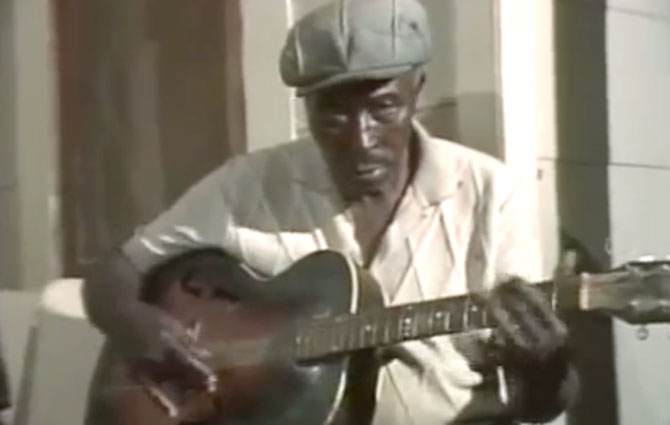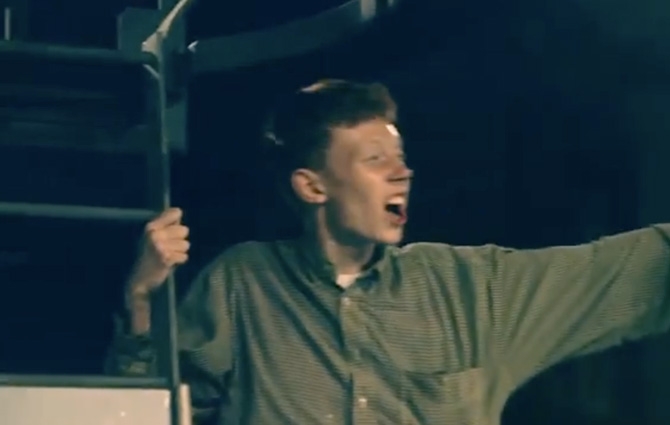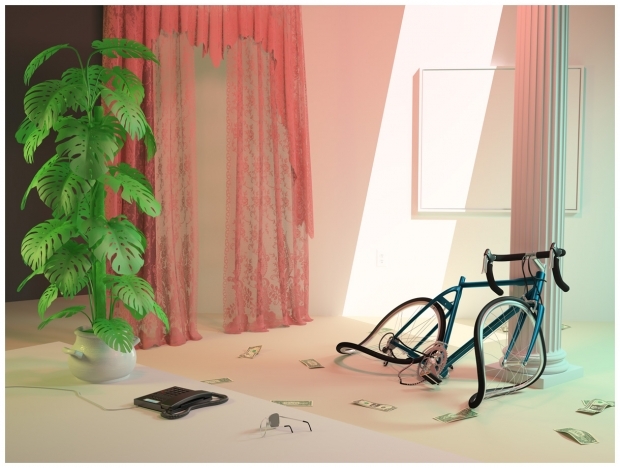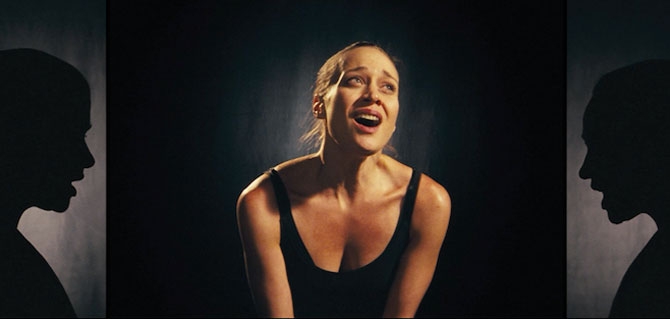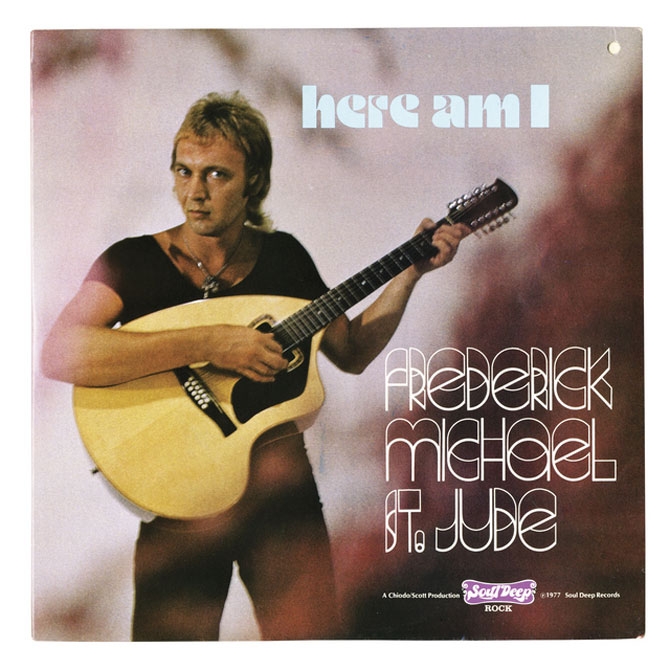There's been a buzz around the massive archive of Alan Lomax recordings that were recently made available online. The NEA-funded CulturalEquity.org now hosts over 17,000 downloadable field recordings made by Lomax during over 60 years of research and documentary work on American folk music. This independent archive is distinct from the collection of recordings Lomax made for the Library of Congress in the '30s and '40s. Folk junkies, open culture advocates, and Lomax-ophiles, go and knock yourself out. But while you're at it, dig into the videos, too. Yes, Lomax and his team shot film—sometimes with multiple camera angles—of folk and gospel performances everywhere from Appalachia to New Orleans in the '70s and '80s. We've culled a few of our favorites below, but trust us, we've just scratched the surface of this treasure trove.
Los Angeles-based filmmakers Focus Creeps have a way with bringing out the raw charisma in Brit rock's most magnetic stars—witness their Arctic Monkey's "R U Mine?" driving vid. For the impossibly young King Krule (18-year-old Archie Marshall, who sometimes goes by the moniker Zoo Kid), the Creeps have shot the singer/guitarist roaming around London, taking trains and hanging on rooftops. The atmospheric piece finds Marshall walking the fine line between youth and grown-up, still holding a cricket bat like the teenager that he is.
King Krule's new album 6 Feet Beneath the Moon is due out August 24. Read Pitchfork's recent King Krule interview.
Seventy-eight might be an inauspicious anniversary to celebrate, but ad agency Leo Burnett is evidently staffed in part by fervent music geeks who just can't help themselves. To commemorate the 78th of the agency founded in Chicago in 1935, the agency commissioned the pressing of an actual 78 rpm record—music curated by the Numero Group with graphics designed in-house as seen below. It also asked Numero to put together a playlist of Chicago tracks—you can download that mix online. It also invited Chicago creatives to design spaces within the office for the anniversary—and sent them one-of-a-kind hand-painted invitations on 78 rpm records to do so.
You can find out more about 78lb at 78lb.leoburnett.com.


The hyper-realistic visuals multimedia artist Takeshi Murata created for Oneohtrix Point Never's new "Problem Areas" clip are actually a big departure for Murata, whose work in the past has been considerably glitchier.
To create the images, which originally appeared in his 2012 solo show "Synthesizers," at Salon 94 in New York, Murata either purchased stock images from a ready-made 3D web mall or rendered images from scratch using digital imaging software. He also made use of open source projects, and what an artist's statement describes as his "DIY high-tech vocabulary."
The pair also collaborated on PointNever.com, which is Murata's interpretation of OPN's new music. Check out some images from "Synthesizers," the "Problem Areas" video below, as well as a 2010 Creators Project feature with Murata showing some of his earlier "data mosh" work.
Oneohtrix Point Never's new full length R Plus Seven is out September 30/October 1 from Warp.


It seems an ex of Fiona Apple, director Paul Thomas Anderson (The Master, There Will Be Blood) has finally found the time to finish the clip for "Hot Knife," the closing track from 2012's The Idler Wheel.
Read more about it at Pitchfork.

Photos by Yewon Kim
The people-watching at the annual Pitchfork Music Festival is almost as good as the music-listening these days. And this year's crowd of festgoers didn't disappoint, turning Chicago's Union Park into its own runway of hybrid summer style. Preppy and punk standards and the best thrift store finds were edged out by bold, sometimes globally-inspired patterns which went nicely with the tropical temperatures and late evening rain showers.
See more photos at Pitchfork.com and more street fashion at Elle.com.
Directed by designer Kate Moross and filmed at the London Zoo, Washed Out's latest video "Don't Give Up" focuses us on the exquisite details and natural beauty of animals. Moross goes in for close-ups on flamingos and pulls brilliant colors from her subjects while also evoking our nostalgia for Mutual of Omaha specials in the slow-motion segments.
We tend to forget how the underground rockers of the early '90s often embraced the ugly and obnoxious. Here, in a forgotten TV commercial for Nirvana's third album In Utero, the trio gets weird with comic "Bobcat" Goldthwait. It's a slightly disturbing relic of an influential era. We're doubtful that it was ever broadcast.
By the end of the 1970s, after about a decade of releasing music, Syl Johnson hadn't had much commercial success. A few years later, after he had left the music industry and started a chain of seafood restaurants, he discovered that his soul records were the source of a huge number of uncleared samples on early 1990s hip-hop records. While Johnson eventually made a living from licensing fees, he still has roughly 85 pending lawsuits against labels, rappers, and producers for uncleared samples.
Filmmakers Robert Hatch-Miller, Puloma Basu, and Michael Slaboch just launched a Kickstarter campaign to finish a new documentary about Syl Johnson's odd trajectory from music to seafood and back featuring awesome archival performance footage from his appearances on Soul Train, interviews with Ken Shipley from Johnson's new label Numero Group, and Syl's family and former bandmates.
Nothing Major Editor John Dugan emailed co-producer of the doc Michael Slaboch for more intel.
For those not familiar, who is Syl Johnson? Where would we know his music from?
Syl's biggest hit was in 1975 when he went to #7 on the R&B chart with "Take Me To The River." But as of late you've probably heard his music being sampled by artists such as Jay-Z and Kanye West, Wu-Tang Clan, Kid Rock, and hundreds of other artists.
What inspired you and Rob to make the doc and how long has it taken?
I've been working/collaborating with Syl since 2008 due to my affiliation with The Numero Group. We started shooting footage here in Chicago leading up to the very first Eccentric Soul Revue we produced in April 2009 at the Park West in Chicago. The rehearsals for that particular show where we made Syl learn all of these tunes he had never performed on stage before was when I first really noticed how fun, charming, and crazy Syl is in person and on camera. Since the show was such a success we took it on the road later that year, and I invited Rob to join Syl and I as we did a interviews at WFMU and WNYC. It was Rob that really planted the proverbial seed with Syl about making a film about him and his remarkable life, and we've been shooting on and off ever since.
What kind of footage are you getting?
We've got about 50 hours of verité-style footage of everything from Syl gardening, to him talking to The New York Times, to life on the road, to just hanging out and being Syl.
Do you have much vintage period stuff to work with? Was that hard to find?
There's not much, unfortunately. We had to pay for the Soul Train footage, and he was on another episode as well which they can't seem to find in their archive. Beyond that, there's some amazing footage from 1975 and a few other odds and ends. But all in all, not much was filmed.
How does gardening figure in to the Syl Johnson story?
Syl has an amazing garden and he really seems to enjoy gardening all day in the summer. He shares organic vegetables with everyone in the neighborhood and really takes care of himself by eating healthy, juicing, and staying fit at 77 years old!
Where do you see this documentary going? Being viewed?
Our goal is to get into film festivals next year and hopefully get some distribution for theatrical, VOD, streaming, downloads, etc.
The editing can be the really tough part of a doc, making a compelling story out of ton of material and having to cut out detours that don't contribute to the central themes. Has that been tough to do? Or has it come naturally?
A huge portion of this Kickstarter is going towards hiring an editor who can put this all into a compelling story. The elements are there for the most part, we need to shoot some more interviews, but for the most part the bulk of it has been done and some fresh eyes and ears will really bring it together. That's been the hardest part. Rob has done most of the editing and we've had a couple of other people and awesome volunteers log all of the footage so that we can pass it off in the most professional way possible to whomever ends up editing this amazing story.
Check out the Syl Johnson: Any Way The Wind Blows trailer below, and back the project for a digital download of the film, admission to a private rough-cut screening, or a T-shirt designed by Jess Rotter at the bottom of the post.

Perhaps you're a big fan of Dennis the Fox? No. Maybe more of a Frederick Michael St. Jude enthusiast, hmm?
You might not know these music acts from days gone by but that doesn't mean their records don't exist. They were the ambitious dreamers and wannabes who, record label be damned, pressed up their own albums in the '60s and '70s. Their records are what collectors call private press, they were released by the musicians themselves in very limited quantites rather than by a functioning long-term record label. Recently, we told you about Enjoy the Experience, Homemade Records 1958-1992, a new coffee table book about private press records covering the amazing homespun and often hilarious artwork for such oddball albums.
This month, if you're swinging through NYC, you can see them for yourself. Co-editor of the book and collector Johan Kugelberg is showing years selections from his collection, many of them featured in the book Enjoy the Experience, at Milk Gallery through July 24. You'd be a fool not to stop in to see an original Kaplan Brothers, wouldn't you?
Curious to hear the tunes from this rare vinyl collection? You can listen to some samples online.
Pitchfork has a longer form interview with Kugelberg in Paper Trail.









